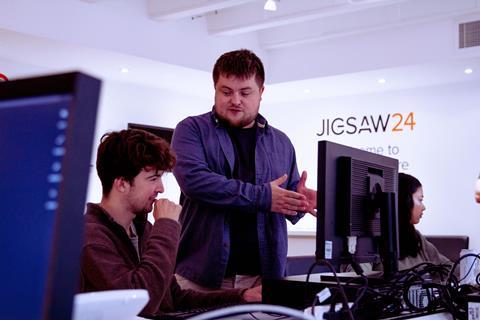Jason Cowan, Jigsaw24 Media business director, on the company’s post-production training scheme

Fernanda graduated in 2020 with a degree in Film Production. She spent the next year producing social media content for her mum’s small business. James studied film and media at college but ended up working in kitchens while trying to get a break in audio editing. Stories like these have become all too common recently as, during the pandemic, the development of junior entrants in the post-production industry practically ceased altogether. And the situation has broader implications than just being frustrating for these entrants to the post-production community. When the sector bounced back and the volume of post-production work increased significantly, the absence of junior talent moving up through the ranks over the last two years contributed to the shortage of people available to complete this work.
By early 2022 post houses were scrambling for staff. With junior tech ops in particularly short supply, Chris Spearman, Head of Operations at Picture Shop (previously The Farm) recognised that the only solution was to develop their own talent at an accelerated pace. “We wanted to feed the operational requirements that the industry was lacking as quickly and efficiently as possible, and also give opportunities to a wave of people who had the aptitude but who hadn’t had opportunities for the past 18 months,” he explains. “Instead of there being hundreds or thousands of runners, we wanted to put people into positions where they could quickly become operators and help with the backlog.”
Discussions with professional partners and friends at Jigsaw24 Media revealed a shared industry interest and the two organisations joined forces to develop a training programme to fast-track the progression of new starters at Picture Shop and develop future post-production talent. A short while later, the P.O.S.T scheme was launched.
The P.O.S.T scheme
The Post Operators Skills Training scheme is an intensive two-week course designed to give junior operators a comprehensive understanding of the technologies typically used in collaborative post-production workflows. The course is hosted at Jigsaw24 Media’s London premises, presented by their industry-leading instructors, and includes both theoretical and practical elements.
One of the key elements for the hands-on modules was to emulate a working machine room in a post-production facility. “We wanted to make the experience as akin to the real-life working environment as possible,” says Spearman. “But we also needed it to be a safe space where students could get practical experience without the risk of deleting a vital piece of media – and Jigsaw24 Media were in a good position to provide that.”
To this end, Jigsaw24 Media’s solution architect and lead technical trainer, Neal Kemsley, used the company’s Nutanix platform to set up a training room with virtualised instances of software including Avid Media Composer, NEXIS, Davinci Resolve, Avid Pro Tools and Flame. Strategy director, David Skeggs, describes the setup as “a modern classroom that offers speed to deploy a single desktop with multiple configurations and different versions of software - so one minute trainees could be creating an Adobe workflow and the next they could be working in Media Composer.”
For participants like Michael who studied photography before joining Picture Shop as a runner, getting hands-on with the technology was especially useful, “I’ve never used Avid Media Composer before so getting to grips with the software was really helpful to me and made me believe in myself a bit more.”

A unique aspect of the training is that a technical supervisor from Picture Shop is present throughout, to provide a common thread and contextualise the theory into real world practice. “Having someone in the room to explain how things are relevant in Picture Shop’s post-production environment was really helpful because abstract things are immediately made concrete” recalls Patrick who took part in the second scheme in September 2022. But, while the course has been designed to meet Picture Shop’s specific needs, Kemsley is quick to point out that it is ‘not about the Picture Shop’s processes’ and that the aim is to give junior staff an understanding of the full post-production process. Spearman concurs adding, “There may be specific naming conventions and housekeeping rules which are unique to our operation but we’re working on genres that span the industry and the skills are ultimately transferrable.”
The third element of the scheme is all about providing the context of the tech ops’ role in broader post-production workflows – and exposing the different pathways their careers could take. Trainees spend time with key professionals in different areas of Picture Shop, from producers to quality control, mastering, vfx and colour grading. “Learning about workflow and meeting everyone who works on different sections of the pipeline to see how it comes together has been extremely useful,” says Fernanda whose long-term goal is to work in colour grading. “You need to take all that theory and put it into context. When you look at all these things from further away you realise there’s a lot more going on and you start to understand how the industry as a whole functions and not just how to click this button in Media Composer, it’s a lot bigger than that.”
The proof is in the pudding
The P.O.S.T scheme may have been born out of necessity, but as Spearman notes “Like all things with the pandemic, it was an opportunity to review how things were done. Not only has it injected a lot of skills into depleted teams, but it has instilled confidence as there’s a real understanding of processes at a deeper level.” The benefits of the training also extend beyond the practical requirements at Picture Shop, “While it solves a problem for now, ultimately it’s about arming people with skills they can build on and grow with.”
Since taking part in the P.O.S.T scheme, both Will and Anthony have been promoted to positions as Edit Assistants at Picture Shop. For Anthony, the course gave him the confidence and speed he needed to progress, while Will says it gave him a deeper understanding of the various Avid technologies and processes. Tom has already put some of the hardware troubleshooting techniques he learned on the course into practice with clients and Samuel says that most of what he does in edit support links back to what he learned in the scheme. But perhaps this feedback from Sonia best sums up the value that the training provides, “It was a great experience that enforced my passion for post-production, giving me an opportunity to learn more and pursue my goals. After the scheme, I was offered a position of Trainee Edit Assistant at Picture Shop and that was the best news ever!”
![Jason Cowan[35]](https://d11p0alxbet5ud.cloudfront.net/Pictures/480xAny/9/6/0/1383960_jasoncowan35_439058.jpg)
Jason Cowan is Jigsaw24 Media business director

































No comments yet